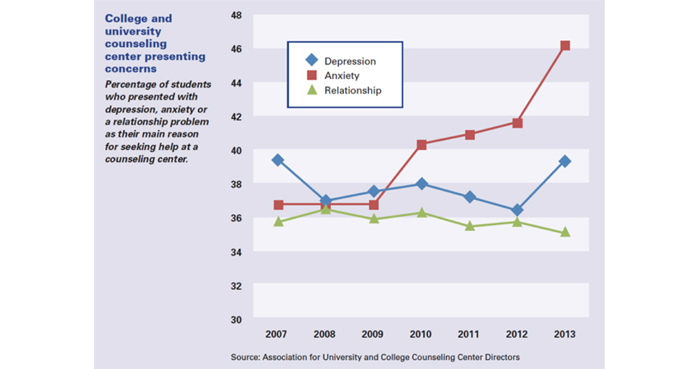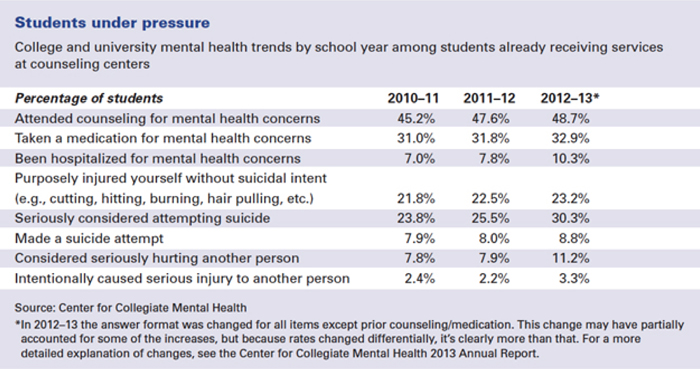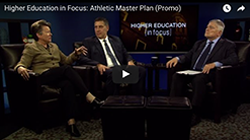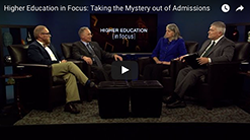Universities across the country are facing a major challenge – the mental health of our students.
The most common concerns are familiar to all of us – anxiety, depression, stress, family, academic performance and relationship problems. The data is compelling in terms of the magnitude of the problem. According to a study by the 2013 National College Health Assessment, nearly half of college students said they felt overwhelming anxiety in the last year. According to Penn State psychologist Ben Locke, who directs the Center for Collegiate Mental Health, more than 30 percent of students who seek services for mental health issues report that they have seriously considered attempting suicide at some point in their lives.
In addition, the numbers of students seeking counseling has grown substantially over the last decade. The reasons for the growth in the numbers of students seeking counseling is debated, and may even be related to the de-stigmatization associated with mental health – which would be a very good sign. Unfortunately, universities have struggled to keep up. Over the last 10 years, our Division of Student Affairs has added 20 positions related to student health and CAPS (Counseling and Psychological Services). The growth in positions has had a positive impact, but the challenge remains as the number of students seeking assistance continues to grow.
It is gratifying to see the response of our students and our staff. Penn State’s class of 2016 has chosen to start its legacy through the Class Gift by establishing an endowment to support CAPS. Undergraduate student government sponsored a Mental Health and Wellness week, and have called on the University to find the funds to increase even further the number of counselors. Longtime Penn State administrators Rod and Mitch Kirsch recently committed $50,000 to help launch the Embedded Counselor Program, which will position a therapist in one of the residence halls. During finals week, the University Libraries hold a DeStress Fest; students can pet puppies brought to campus for cuddly stress relief; or take free yoga classes. I even had a student write to me urging us to encourage (even require) students to take a course to help relieve stress, such as Kinesiology 82: Action Methods for Stress Management (3 credits) or KINES 83: Exercise for Stress Management (1.5 credits.). Through the Center for Collegiate Mental Health our faculty and staff are working to connect practice, research and technology to benefit students, mental health providers, administrators, researchers and the public.
The good news is that we continue to introduce new strategies and new ways to educate our students, faculty and staff. Given that we’re about to enter peak stress season with the onset of finals, I want to share a few other ideas, as well as a few of the resources available to you electronically and on the University Park Campus (our Commonwealth Campuses have events/services customized for their student populations).
Online Resources:
Online modules help students cope with test anxiety and stress: iStudy Tutorials http://istudy.psu.edu/
Under Online Resources for Relaxation, there are a number of links, including one to Free Guided Meditations. http://studentaffairs.psu.edu/counseling/
CAPS also has a wide range of self-help resources: https://studentaffairs.psu.edu/counseling/self-help.shtml
Under Quick info, you’ll find 9 to 30 minute Educational Videos created by the CAPS counselors on coping skills, test anxiety, coping with anxiety and depression, among others. http://studentaffairs.psu.edu/counseling/services/videos.shtml
In Person/Phone
For more information or to make an appointment at CAPS, call the main number at 814-863-0395
Centre County CAN HELP line 1-800-643-5432
Emergencies: 911
Also watch for campus-wide events designed to lessen the pressure that comes with deadlines, tests and term papers. My own advice (which I need to follow more often) is to take a walk, especially at this time of the year. The Arboretum is beautiful and the ducks are back at the Alumni Center (and just about everywhere else too!)
Thank you to the student who sent me the letter that helped to prompt this post. And keep your ideas coming.









Student life has many benefits, but it also imposes inevitable stresses. For those who are already battling depression or have an existing vulnerability to it, these stresses can trigger anxiety and episodes of depression. http://www.nationaleducationalliance.com/
Thank you for the thoughtful responses to the Students Under Stress post. In addition to the post, I have also dedicated the April 21st episode of my show, Higher Education in Focus, to the topic. It can be viewed online at: https://wpsu.psu.edu/tv/programs/infocus/
Dear Eric-
Thank you for your column, “Students Under Stress”. I think we as faculty play a role in moderating stress. We cannot do away with exams and assignments, but we can try to avoid doing things that enhance stress. We can avoid a bolus of assignments on one day or weekend. We can be flexible in adjusting deadlines to individual students as needed. We can make statements that if someone is feeling overwhelmed they can see us or we can refer them to the other resources on campus. And we can set a welcoming and positive tone in our classes, rather than a competitive and stressful one. There is much faculty, indeed all Penn Staters can do, to set a positive and welcoming tone to reduce stress and anxiety. This applies not only to our undergraduates, but our graduate students and postdocs. Thanks for leading on this.
I read your article Students Under Stress on LinkedIn. Thanks for sharing the information, although some of the statistics are quite frightening.
As the father of two college students, I’ve seen first-hand the anxiety and stress issues that can challenge even the best students, especially those living away from home for essentially the first time.
I’d be curious if Penn State has any material, or you know of any, directed towards parents and what we can do to help ease the transition and support our children’s stress issues even when we are not physically there for them. There’s always a fine line between interference / allowing them to grow up and being there when needed for a more serious issue, since stress related issues are not always apparent.
Thanks again for sharing and supporting ideas and information that helps our young people better cope with the challenges of today’s world.
Dear President Barron,
We are a group of concerned students in a CAS 250 class, and one of our assignments was to launch a group campaign. For our campaign, we decided to raise awareness of mental health issues on Penn State’s campus. We are all students on the University Park campus and have experiences with, or friends who have struggled with mental health illnesses.
Depression, anxiety, eating disorders, sexual assault, suicide, and addictions are just a few of the mental health issues that students may face during their time in college. One in four college students have a diagnosable mental health illness; however 40% of those students do not seek help. 80% of college students report feeling overwhelmed by their responsibilities and 50% has been so anxious that they struggled in school.
Each academic year at Penn State, 1,000 students are diagnosed with an anxiety disorder and 1,250 are diagnosed with a mood disorder such as depression. Most students are unaware of the CAPS (Counseling and Psychological Services) program at Penn State. The program is also understaffed and unable to help every student in need of counseling. We generated a campaign which emphasized the need for additional funds for the CAPS program, more readily available resources for students, and for mental health to be emphasized in your convocation speech to each freshman class.
For our group campaign, we made a Facebook page entitled, “Mental Health Awareness on Penn State’s Campus” and a petition asking for support to raise mental health awareness. Within just two weeks, we were able to reach 104 likes on our page and 100 supporters on our petition. Clearly, this is an important issue that needs to be addressed further, since we were able to generate so much support in such a short amount of time. So, we are asking you to put more emphasis on the CAPS program, increase funding to CAPS, and mention the resources available here at Penn State in your freshman convocation speech, just so that all of the students here are aware that student mental health is an issue, but they can get help. Students need to know this so that they are no longer afraid to reach out for help, and so that they know exactly where to get it. With your help, struggling students will feel more comfortable on campus.
Sincerely,
Anna, Toni, Abigail, Mitch, and Rich